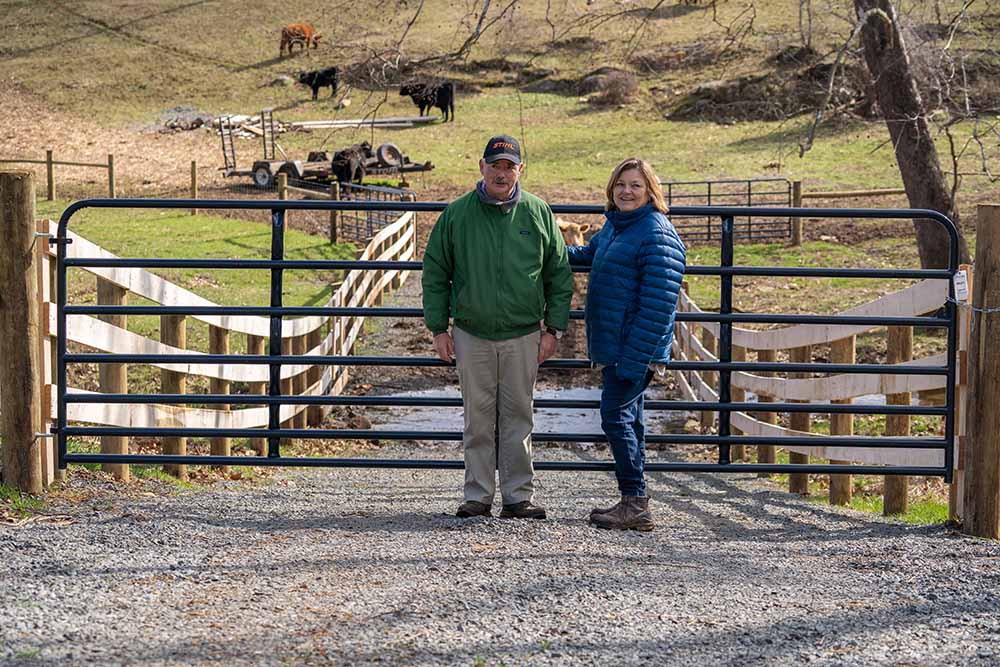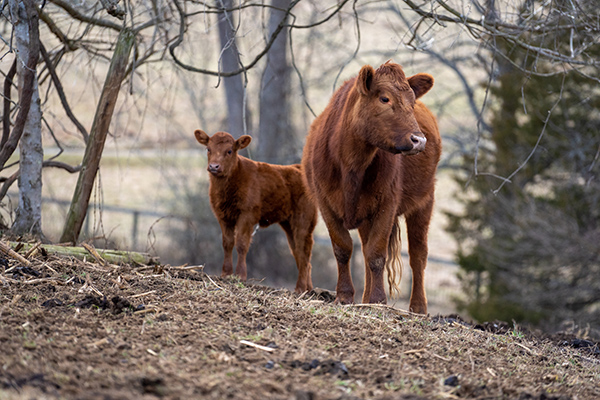
Eight generations of cattle farming had taken its toll on the streams at Dean and Carina Elgin’s Mountain Hollow Farm in northern Fauquier County. Historically, “all the cattle had access to the creek. That was our watering system. And that was the norm in that day,” Dean Elgin said. But by 2015, the Elgins wanted to repair the streambank erosion and reduce the water pollution caused by the foot traffic and waste generated by 200 cattle moving in and out of the water repeatedly. But there was a problem.

Although the Elgins qualified for state and federal cost-share funding for fencing, gates, hardened stream crossings, water pumps and water troughs for livestock, those cost-share programs only reimburse landowners after a project is completed. Like many landowners, the Elgins couldn’t afford the more than $120,000 upfront cost, and the projects were put on hold.
But last year, The Piedmont Environmental Council was able to offer the Elgin’s a short-term loan through our James M. Rowley Goose Creek Conservation Fund.This fund is one of 11 similar conservation funds that PEC manages and that support on-the-ground conservation and habitat restoration projects in specific geographic areas within PEC’s nine-county region. The mission of the James M. Rowley Goose Creek Conservation Fund is to preserve the water quality, scenic beauty, and rural landscape of the—you guessed it—Goose Creek watershed.
With PEC’s loan, the Elgins fenced out over 4,100 feet of streams in the Hungry Run watershed and installed a new well and livestock watering system atMountain Hollow Farm. They’ll repay the loan when the cost-share reimbursement comes through.
“A grant from the Chesapeake Bay Land and Water Initiative, a project of the Chesapeake Bay Funders Network and Land Trust Alliance, helped us create this short-term loan program as a means of helping farmers like the Elgins,” said PEC Director ofConservation Mike Kane. “We think the loan program isa cost-effective way to accelerate the pace of needed water quality improvements in our region, and we hope it will become a model for our other funds that support other parts of the region.”
As Dean, Carina, and their sheepdog Jenny walk along a Hungry Run tributary on the farm, Dean says he looks forward to seeing what will happen now that the cattle are fenced out. “There’s something to clean water.All of a sudden the cattle are drinking well water instead of stream water.”
The Elgins believe they’re lucky to live here. If it weren’t for PEC’s short-term loan program, Carina said,“everything would have deteriorated. We couldn’t have afforded it, otherwise, when all the fences eventually fell down. Dean would’ve had to give up the cows and farming. This lets us start anew.”
Most of PEC’s 11 conservation funds operate with an advisory committee that helps identify projects and provide information to landowners.These funds all provide cost assistance for protecting land with a conservation easement or through a fee simple purchase. They also offer short-term loans for land owners interested in working with their local soil and water conservation district on land management cost-share programs.
For more information on the James M. Rowley Goose Creek Fund or other PEC conservation funds, give us a call or email conservation@pecva.org
This article was featured in our Spring 2020 member newsletter, The Piedmont View.
